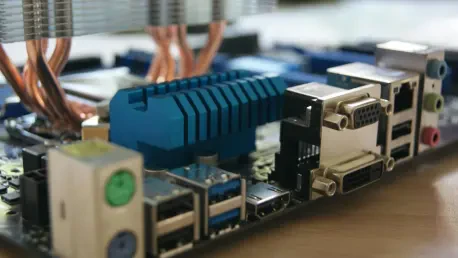In an era where digital infrastructure is expanding at an unprecedented pace, the demand for robust cooling solutions to support data centers has never been more critical, especially with the rise of artificial intelligence (AI) and high-density computing technologies that push the limits of current systems. Modine Manufacturing, a key player in thermal management systems, has taken a significant step to address this growing need by unveiling plans for a new 153,000-square-foot facility in Franklin, Wisconsin. This strategic expansion aims to bolster the company’s capacity to produce advanced cooling equipment tailored for data centers, which are increasingly vital to the global economy. As data centers grapple with the immense heat generated by cutting-edge technologies, Modine’s move signals a proactive response to an industry challenge that impacts everything from energy consumption to operational efficiency. This development not only underscores the company’s commitment to innovation but also highlights the broader trends shaping the digital infrastructure landscape.
Addressing the Data Center Boom
The surge in data center activity, driven by AI applications and cloud computing, has created an urgent need for specialized cooling solutions that can handle the intense heat output of modern servers. Modine’s new facility in Franklin is poised to meet this demand by producing massive coolers, some weighing up to 33,000 pounds, designed specifically for hyperscale and colocation operators. This expansion aligns with a larger $100 million investment strategy announced by the company to enhance its thermal control product capacity for data centers. Company executives have emphasized that the growth in this sector is a cornerstone of their long-term vision, with projections estimating data center revenue could reach $2 billion by Fiscal 2028. The focus on scalable solutions reflects an understanding of the market’s trajectory, as digital infrastructure continues to expand globally, particularly in the United States, which hosts a significant share of the world’s data center operations.
Beyond the technological implications, Modine’s expansion is set to have a substantial economic impact on the local community in Franklin, Wisconsin. City officials, including Mayor John Nelson, have expressed optimism about the projected job creation, with plans to employ 300 workers by March 2026 and potentially up to 436 over the next three years. Immediate hiring needs include 55 positions ranging from entry-level assemblers to skilled engineers, with the company actively encouraging applicants, even those without prior experience, by offering training programs. Supported by $1.6 million in tax increment financing from the city, contingent on a minimum investment of $26.4 million by Modine, this project is seen as a stable asset for the region. The economic ripple effects of such a development extend beyond job numbers, promising to strengthen the area’s industrial base while addressing the critical needs of a high-growth industry.
Industry Trends and Parallel Investments
Modine’s initiative is part of a broader wave of industrial investments across the United States aimed at supporting the burgeoning data center and digital infrastructure sectors. The rapid growth of AI and data-intensive technologies has prompted numerous companies to scale up their manufacturing capabilities to keep pace with market demands. For instance, significant commitments from other industry players highlight a shared focus on enhancing infrastructure, with projects spanning grid support, backup power systems, and advanced manufacturing. These efforts reflect a consensus on the urgency of addressing the technological and logistical challenges posed by the digital economy. The trend toward U.S.-based manufacturing is particularly notable, as domestic production is increasingly seen as essential to meeting the robust demand within the country’s borders.
While Modine’s expansion focuses on thermal management, the industry’s collective response also encompasses a wide array of solutions tailored to data center needs, from power systems to renewable energy integration. The scale of investment across various states underscores the interconnected nature of these developments, as companies strive to build a resilient foundation for future technological advancements. A key concern remains the strain on local resources, such as water and electricity, due to the high operational demands of data centers, though this aspect often receives less attention amidst the excitement of economic growth. Nevertheless, the strategic emphasis on innovation and capacity building indicates a forward-thinking approach among manufacturers, positioning them to capitalize on the exponential growth projected for the sector over the coming years.
Building a Sustainable Future
Looking back, Modine Manufacturing’s decision to establish a new facility in Franklin, Wisconsin, marked a pivotal moment in responding to the escalating demands of the data center industry. This expansion, coupled with substantial job creation and municipal support through tax incentives, mirrored a national movement to fortify digital infrastructure through targeted industrial growth. The company’s ambitious revenue goals and focus on scalable cooling solutions highlighted its leadership in thermal management during a transformative period for technology.
Moving forward, the challenge lies in balancing economic benefits with environmental considerations, particularly regarding resource consumption in data center operations. Stakeholders across the industry must prioritize sustainable practices, exploring innovations in energy-efficient cooling and water conservation to mitigate potential impacts. Collaborative efforts between manufacturers, local governments, and technology firms could pave the way for more resilient systems, ensuring that the rapid expansion of digital infrastructure supports long-term societal and economic goals.









